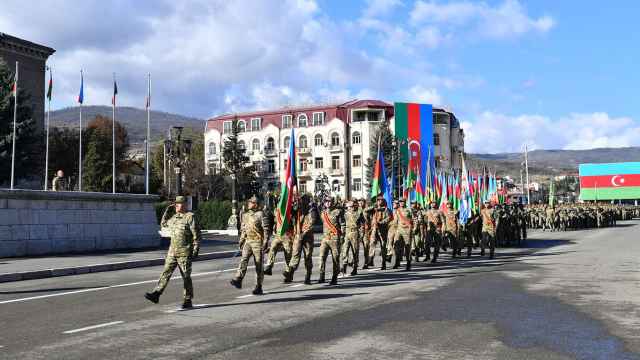 Alexei Bayer
Alexei BayerOne hundred years ago, the Russian Empire entered the bloodiest period any country on Earth had ever experienced before. Between the start of World War I and the death of Stalin 39 years later, at least 60 million men, women and children lost their lives. The monstrous arithmetic works out to 1.5 million dead per year, or more than 4,000 every day.
A majority of the losses occurred in peacetime, as the government systematically executed, starved and worked to death tens of millions of its own citizens. Even in war, while the Nazis perpetrated mass killings on occupied territories, the way Russian and Soviet generals chose to fight almost seems as though exterminating their own forces was part of the strategy. Tallying Russian losses in World War I, a German field marshal wrote: “Five million or eight? We ourselves know not. At times fighting the Russians, we had to remove the piles of enemy bodies from our trenches to get a clear field of fire against new waves of assault.”
By some estimates, a “war of choice” with Finland from 1939 to 1940 resulted in the loss of 500,000 Red Army soldiers, while the profligate waste of lives by Soviet commanders in the Great Patriotic War has been extensively documented by horrified military historians.
No one knows how many died in any of those numerous killing fields. The names of the dead were not recorded and their bodies were dumped in mass graves, called “brotherly” in Russian. The total figure is a gross estimation and comes not from historians but from demographers, who compare the actual population size to what would have been expected under normal conditions.
While most peacetime killings were explained by the exigencies of class warfare against “capitalists and landowners,” ordinary people, workers and peasants were caught in the dragnet in huge numbers. Entire ethnic groups were declared traitors and deported with many people dying along the way. But inasmuch as killings were targeted, they fell heavily upon the smartest, best-educated, most hard-working and productive citizens. The wars, too, tended to kill off the brave and the honest. It was a deliberate extermination of the nation’s elite, not unlike what the Nazis did in occupied Poland — except it was done by Russia’s own government to their own citizens and over a lifetime of an entire generation.
Once again, it is hard not to conclude that sabotaging Russia’s future was part of the strategy. Agriculture was a case in point. First, the government eliminated the most productive and skilled peasants and then killed off the leading biologists, promoting charlatans and fools instead.
What is most striking about this period is its utter futility. In the end, Russia followed the same course as other European nations, but at a grotesquely higher cost. It became urbanized and industrialized, it lost its empire, and its former imperial subjects flooded in, forming a multiracial, multicultural society. It became integrated into the world economy, and its economic model — exporting natural resources and importing manufactured goods — has emerged strictly within the global economic framework.
Despite the mass murder of priests, Orthodox Christianity is once again on the rise, displaying the same vices as a century ago. Even the so-called national character has changed little. Russians love to quote 19th-century writer Mikhail Saltykov-Shchedrin, whose biting satire is just as relevant today. Russia is yet to come to terms and understand what the wanton killing of tens of millions of its citizens was all about.
Alexei Bayer, a native Muscovite, lives in New York. His detective novel "Murder at the Dacha" was published by Russian Life Books in 2013.
A Message from The Moscow Times:
Dear readers,
We are facing unprecedented challenges. Russia's Prosecutor General's Office has designated The Moscow Times as an "undesirable" organization, criminalizing our work and putting our staff at risk of prosecution. This follows our earlier unjust labeling as a "foreign agent."
These actions are direct attempts to silence independent journalism in Russia. The authorities claim our work "discredits the decisions of the Russian leadership." We see things differently: we strive to provide accurate, unbiased reporting on Russia.
We, the journalists of The Moscow Times, refuse to be silenced. But to continue our work, we need your help.
Your support, no matter how small, makes a world of difference. If you can, please support us monthly starting from just $2. It's quick to set up, and every contribution makes a significant impact.
By supporting The Moscow Times, you're defending open, independent journalism in the face of repression. Thank you for standing with us.
Remind me later.





